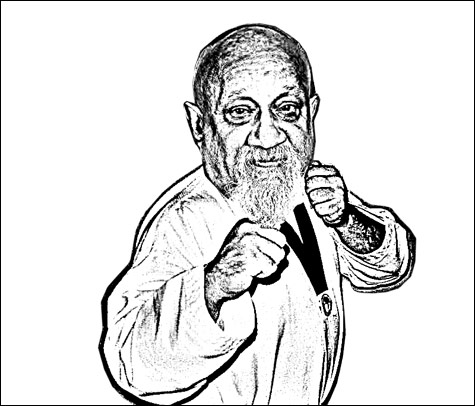
FLIPPING THE SCRIPT: Chuck Turner challenges the media after his arrest.
|
The December 1 New Yorker featured a five-page story by Henry Louis Gates Jr., director of Harvard’s W.E.B. Du Bois Institute for African and African American Research and editor in chief of the African-American news site the Root, on his efforts to use DNA testing to clarify his ancestry. Gates had long believed that one of his great-great grandfathers was a white man, Samuel Brady, who had owned Gates’s great-great grandmother, Jane Gates, and fathered her children. In 2005, Gates began searching for living male relatives of Brady who’d be willing to have their DNA tested. He found two — and learned, subsequently, that Brady was not the father of Jane Gates’s children.
In the story — “Family Matters: When science clashes with ancestral lore” — Gates described his frustration at this abiding lacuna in his genealogy. But his focus, instead, was the power and potential of DNA testing for African-Americans. “[G]enetics can now demolish or affirm a family’s most cherished beliefs and stories with just a bit of saliva and a cotton swab,” Gates marveled. He continued:
With a little patience, and a lot of luck, perhaps DNA can solve the last remaining mystery in the Gates family line, the secret that Jane Gates took with her to her grave.
African-American history is a young discipline; restoring the branches of even one black-family tree can profoundly change our understanding of the larger story of who the African-American people really are. By telling and retelling the story of our ancestors, we can move that history from our kitchens and parlors into the textbooks, ultimately changing the official narrative of American history itself.
This is deep, emotionally fraught material. But from a journalistic point of view, it’s also problematic — because Gates happens to be the co-founder of AfricanDNA, which specializes in the sort of testing he’s extolling here. The most inexpensive options at AfricanDNA are the basic paternal- and maternal-lineage tests, which retail for just $189; four other tests are also available, including the combined genealogy report and paternal-/maternal-lineage test, which costs a robust $1277.
This doesn’t mean that Gates shouldn’t write about the implications of DNA testing for the black community. In fact, between his status as a preeminent scholar of the African-American experience and his intimate knowledge of DNA testing, he’s uniquely equipped to discuss the subject. The key, obviously, is finding a graceful way to acknowledge Gates’s clear commercial interest in the technology in question as he does so.
The Washington Post Company, which publishes the Root, seems to grasp this. Click on the “Test Your DNA” link on the Root’s home page, and the following disclosure immediately pops up: “Though theroot.com has a business relationship with africandna.com, which was co-founded by Henry Louis Gates Jr., there are many other companies that offer DNA-testing services.” Five competitor URLs follow.
In an e-mail to the Phoenix, Gates said his New Yorker piece didn’t mention AfricanDNA “because it did no testing for any result that I discussed in the essay. In fact, the company didn’t exist during any of the testing or filming of my two PBS series [African American Lives and African American Lives 2]. And in any future series, africandna.com will not be involved in any genetic testing for the program.”